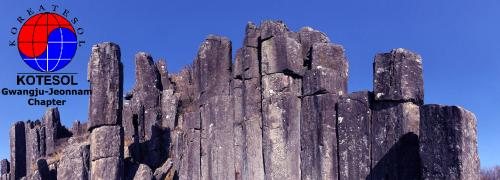
Gwangju-Jeonnam KOTESOL August Meeting
Time: Saturday, August 10, 2013, 1:30 p.m.
Place: Chosun University (Gwangju), Main Building (본관), Room 5210.
Admission: No charge. (Future membership is welcomed.)
Schedule
1:30 pm: Sign-in and Meet-and-Greet
2:00 pm: PRESENTATION 1
'Memorable' Vocabulary Teaching and Learning
Jessica Magnusson (Gwangju National University of Education, Gwangju)
2:45 pm: Refreshment Break
3:00 pm: PRESENTATION 2
Guided Reflection Teacher for Busy Teachers
Roger Fusselman (Seoul Chapter)
4:30 pm: Mini Swap-Shop Session
Share your Teaching Ideas, Classroom Activities, and ELT Games, Books, etc.
(Open to All Attendees. Handouts welcomed.)
4:45 pm: Announcements / Drawing for Door Prizes / Closing
================================
Presentation Abstracts and Presenter Biographical Sketches
Presentation: 'Memorable' Vocabulary Teaching & Learning
By Jessica Magnusson
Many English language learners are willing to communicate in English but feel that they lack the vocabulary and expressions to properly convey their meaning. Another frustration comes from the feeling that they are “forgetting” words that they have learned, or that they don’t have a deep enough knowledge of a word to use it in spoking or writing.
As a teacher, I want my lessons to be memorable in two senses of the word. The first sense of “memorable” that I want my students to experience refers to “a positive or valuable learning experience.” English language learning causes a great amount of stress for many learners, so a positive learning experience is essential to future learning. The second sense of the word “memorable” that I want to achieve with my students refers to helping students increase their rate of retention of the material studied.
Two different types of memory tasks in language learning are recognition memory tasks and recall memory tasks. Recognition memory tasks give students enough knowledge of a word in order to “recognize” it. Traditionally, many English education programs have focused on using mostly recognition memory tasks. This is what allows students to perform well on tests with multiple-choice questions, but struggle as they try to use and apply their knowledge in production. Recall memory tasks require students to recall a word for use in spoken or written production. If English language learners are able to recall a word, they are most likely able to remember it for the long-term. Recognition and recall memory will be discussed during the presentation.
In addition, the presentation will address some techniques that both teachers and students can use to drastically enhance vocabulary retention, including repetition, spacing, imaging, and use. The presentation will conclude by introducing practical classroom vocabulary activities that will make vocabulary learning memorable (retained for the long-term) and even more memorable (a positive and valuable learning experience).
The Presenter
Jessica Magnusson has been teaching English in Korea since 2006. She is dedicated to life-long learning and professional development. Ms Magnusson has worked as an EFL instructor and teacher trainer in Korea. Currently she teaches EFL conversation courses, teacher training courses, and special programs at Gwangju National University of Education. Prior to coming to Korea, she worked as an EFL instructor for four years in Guangdong Province, China. She has earned a Masters in TESOL from the School for International Training in Brattleboro, Vermont (USA). Her main areas of interest include teaching literacy to young learners in an EFL context and story-based instruction.
==============
Presentation: Guided Teacher Reflection for Busy Teachers
By Roger Fusselman
Conscientious teachers engage in reflective practice, a way of looking at their work in a manner that makes it better. This may be simple to define but hard to apply, without knowing how to reflect or what to look for. Thankfully, there are standards, methods to reflection, and best practices that every teacher should know, to narrow this gap in our understanding. But, let’s face it: we teachers are busy people. How can we simplify the process for us? One answer to this problem is guided reflection, clear steps by which we can move our teaching forward, while still having time for the rest of life’s concerns.
This 90-minute workshop will involve your active participation in applying concepts related to reflective practice. These concepts include a modified version of Gibbs’s model of reflective practice (1988), which describes the cycle by which we consider our classrooms and how to analyze them. Participants will get a chance to discuss questions for teacher reflection, any of which will involve your past experiences as both students and teachers. Everyone will receive a checklist to provide their own practice as teachers with a list of observable standards. With these topics covered, we will watch an amusing video of a lesson in English. In groups, you will discuss its merits and/or its drawbacks, applying techniques and concepts from the earlier portions of this presentation.
The Presenter
Roger Fusselman received his MA in TESL from the University of Central Missouri. He is a long-time member of and presenter with KOTESOL, including at many international conferences. He has served as the first vice-president of both the Seoul and Busan chapters. Roger has taught in one capacity or another in Korea for over thirteen years, including three years of TESOL training at Seoul National University of Education. Students in Seoul, Daejeon, Pohang, and Ulsan have learned from his lively style of teaching. Roger has also been an active member of the comedy troupe Seoul City Improv for the last two years. He is also a valued member of the public speaking group Yeouido Toastmasters. Roger can be reached at mrfusselman@gmail.com.


